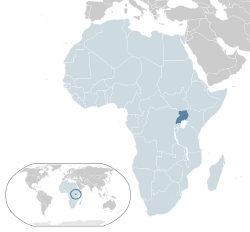Reactions
Dora Bloch, a 75-year-old British Jewish immigrant, was taken to Mulago Hospital in Kampala, and was murdered by the Ugandan government, as were some of her doctors and nurses for apparently trying to intervene. [17] In April 1987, Henry Kyemba, Uganda's Attorney General and Minister of Justice at the time, told the Uganda Human Rights Commission that Bloch had been dragged from her hospital bed and murdered by two army officers on Idi Amin's orders. Mrs Bloch had been shot and her body dumped in the trunk of a car which had Ugandan intelligence services number plates. Bloch's remains were recovered near a sugar plantation 20 miles (32 km) east of Kampala in 1979, [16] after the Ugandan–Tanzanian War led to the end of Amin's rule. [18]
The government of Uganda, led by Juma Oris, the Ugandan Foreign Minister at the time, later convened a session of the United Nations Security Council to seek official condemnation of the Israeli raid, [19] as a violation of Ugandan sovereignty. The Security Council ultimately declined to pass any resolution on the matter, condemning neither Israel, nor Uganda. In his address to the council, Israeli ambassador Chaim Herzog said:
We come with a simple message to the Council: we are proud of what we have done because we have demonstrated to the world that a small country, in Israel's circumstances, with which the members of this Council are by now all too familiar, the dignity of man, human life and human freedom constitute the highest values. We are proud not only because we have saved the lives of over a hundred innocent people—men, women and children—but because of the significance of our act for the cause of human freedom. [20] [21]
Israel received support from the Western World for its operation. West Germany called the raid "an act of self defense". Switzerland and France also praised Israel for the operation. Significant praise was received from representatives of the United Kingdom and the US both of whom called it "an impossible operation". Some in the United States noted that the hostages were freed on July 4, 1976, which was 200 years since the signing of the US declaration of independence. [22] [23] [24]
UN Secretary General Kurt Waldheim described the raid as "a serious violation of the national sovereignty of a United Nations member state". [25] Dozens of Ugandan soldiers were killed in the raid. The Arab and Communist world condemned the operation calling it an act of aggression.
For refusing to depart (and subsequently leave some of his passengers as hostages) when given leave to do so by the hijackers, Captain Bacos was reprimanded by his superiors at Air France and suspended from duty for a period. He was awarded by Israel for his heroism in refusing to leave the Jewish hostages behind. [26]
In the ensuing years, Betser and the Netanyahu brothers—Iddo and Benjamin, all Sayeret Matkal veterans—argued in increasingly public forums about who was to blame for the unexpected early firefight which caused Yonatan Netanyahu's death and partial loss of tactical surprise. [27] [28]

